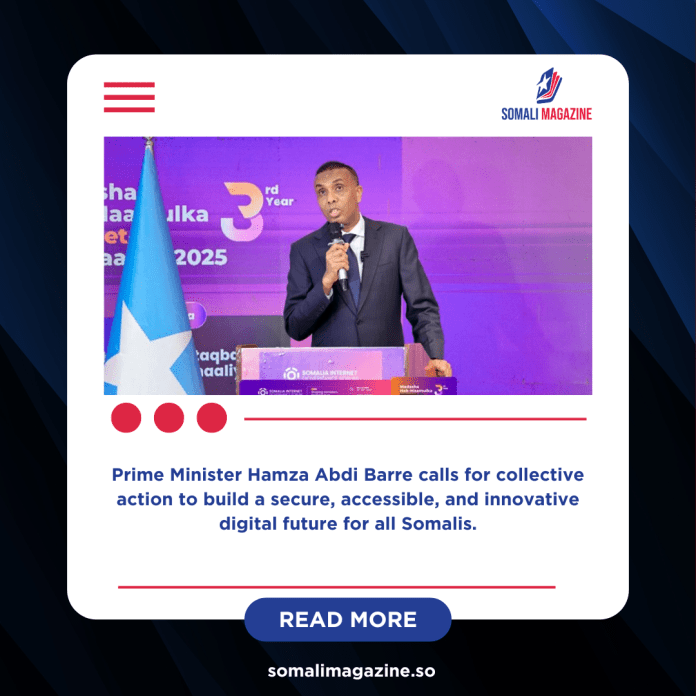Facebook Twitter (X) Instagram Somali Magazine - People's Magazine
Somalia took another step toward strengthening its digital future on Tuesday as Prime Minister Hamza Abdi Barre officially opened the Somalia Internet Governance Forum 2025 (SIGF 2025) in Mogadishu. Now in its third edition, the forum serves as the country’s main platform for discussing national digital policies and strategies that support Somalia’s growing digital transformation.
In his remarks, Prime Minister Barre described the internet as “the backbone of national development,” stressing that proper internet governance not only builds trust between citizens and the government but also promotes innovation and protects people’s rights online. He called for a united effort among all stakeholders—including government institutions, private companies, technology experts, and civil society organizations—to create digital policies that are inclusive and beneficial to every Somali, regardless of background or location.
The SIGF 2025 has become an important space for collaboration among various players in the digital ecosystem. Participants discussed how Somalia can improve its digital infrastructure, expand connectivity, and strengthen cybersecurity. The event also aimed to encourage innovation in public services through technology, ensuring that the government can deliver better, faster, and more transparent services to citizens.
Despite notable progress in the past few years, Somalia still faces challenges in digital access and affordability. According to government data, internet penetration in the country stood at about 10.9% in early 2024, meaning roughly 5 million Somalis were connected out of a total population of 18.4 million. Mobile networks remain the main gateway to the internet, covering almost half of the population with a 44.7% penetration rate. However, access remains uneven—urban centers like Mogadishu and Hargeisa enjoy stronger and faster connections, while rural areas often struggle with limited coverage and high data costs.
The government, along with its partners, has been working to bridge this digital divide by investing in new technologies and regulatory frameworks that promote competition and lower prices. The introduction of Starlink satellite internet, for example, has created new opportunities for expanding connectivity in remote and underserved regions. Still, affordability continues to be a major issue, with many households unable to sustain the cost of data plans and devices.
Prime Minister Barre reiterated that Somalia’s digital growth depends on a well-managed, secure, and inclusive internet ecosystem. He noted that effective internet governance will not only strengthen communication and economic activities but also play a crucial role in national security and education. The Prime Minister added that the government remains committed to supporting policies that make the internet accessible, affordable, and safe for all citizens.
As the SIGF 2025 concluded, participants expressed optimism about Somalia’s digital future. They highlighted the importance of collaboration among local innovators, international partners, and the private sector to develop new solutions for connectivity and digital literacy. The forum reaffirmed Somalia’s vision of becoming a digitally empowered society—one that leverages technology to drive social and economic progress, empower young entrepreneurs, and strengthen governance.

